

#Religious thank you graphic series
Most expressive products, such as books, are not customized, and most customized products, such as cooked-to-order hamburgers, are not expressive.Ĭarpenter points to guidelines that, in a series of amicus briefs, he and Eugene Volokh have proposed to the Court. In order to be entitled to discriminate, a vendor’s product must be both customized and expressive, constituting the vendor’s own expression, and the objection must be “to the message contained in the product itself, not to the identity or status of the customer.” If he is right, the decision applies only in very narrow circumstances. Smith seeks to engage in expressive activity.” By relying on that stipulation, Gorsuch was able to write an opinion that said nothing about the boundaries of the protected category.Īt the conservative legal blog The Volokh Conspiracy, Dale Carpenter optimistically argues that the case lays down a narrow rule. Which ones?įaced with what he called a “sea of hypotheticals about photographers, stationers, and others,” Gorsuch conceded that “determining what qualifies as expressive activity protected by the First Amendment can sometimes raise difficult questions.” Here, though, he wrote, no one disputes-indeed, the parties stipulated-that “Ms. What are the rules now? Some businesses have a constitutional right to discriminate against potential customers. The Supreme Court lays down constitutional rules that are binding on lower courts and, ultimately, on citizens.

#Religious thank you graphic free
Justice Neil Gorsuch, writing for the majority, agreed: First Amendment free speech means that law may not “compel an individual to create speech she does not believe.” She sued the state, seeking a preemptive ruling that law couldn’t be applied against her. The Colorado Anti-Discrimination Act (CADA), however, bans businesses that are open to the public from discriminating against gay people or announcing their intent to do so. Unwilling to design sites for same-sex weddings, she wants to say that on her own promotional website.

She wants to expand her business to include custom-designed wedding websites, but she opposes same-sex marriage on religious grounds. Elenis concerns Lorie Smith, who owns a graphic design firm. While the Court might have clearly limited the scope of its decision, some members of the Court-including Justice Neil Gorsuch, who wrote the Court’s opinion-are drawn toward broad and dangerous specifications that can only be applied selectively to benefit claimants whom the judges happen to like.ģ03 Creative v. Its opinion in the case is startlingly vague about the boundaries of that category. Elenis, the Supreme Court has now declared for the first time that some for-profit businesses have a constitutional right to discriminate against anyone for any reason they like. Lorie Smith, a Christian graphic artist and website designer in Colorado, right, accompanied by her lawyer, Kristen Waggoner of the Alliance Defending Freedom, second from left, speaks outside the Supreme Court in Washington, December 5, 2022.


 0 kommentar(er)
0 kommentar(er)
